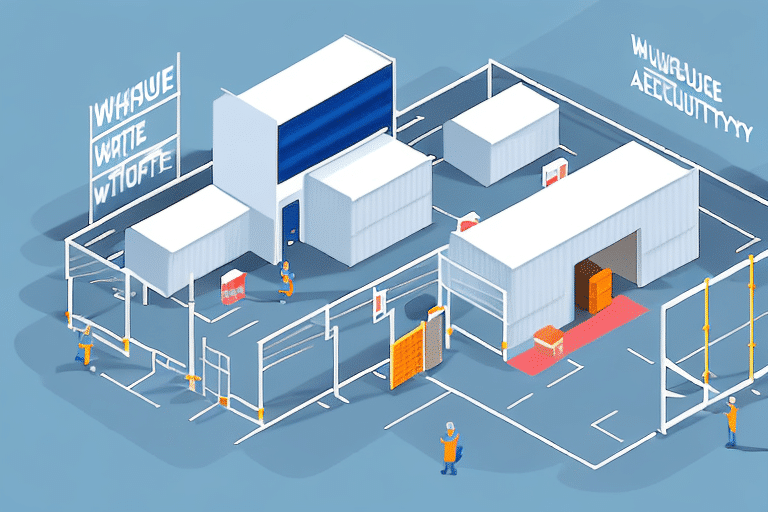What Is a Bonded Warehouse and How Does It Work?
If you are a business owner involved in importing and exporting goods, you may have encountered the term bonded warehouse. This article delves into the definition, purpose, history, benefits, and future trends of bonded warehouses. Additionally, we will explore how to set up a bonded warehouse, the types of goods that can be stored, the impact of customs regulations, and the differences between bonded and public warehouses. We will also examine the role of logistics companies in bonded warehousing, the advantages and disadvantages of using such facilities, and how to choose the right warehouse for your business. To illustrate these points, we will include case studies showcasing the successful use of bonded warehouses across various industries.
The Definition of Bonded Warehouses
A bonded warehouse is a secure facility authorized by government customs agencies where imported and exported goods can be stored, processed, and manipulated before being released into the local market or re-exported to another country. Storing goods in a bonded warehouse allows companies to defer customs duties and taxes until the goods are either released into the local market or exported. Bonded warehouses also provide companies the flexibility to re-export goods without incurring any duty or tax.
Bonded warehouses are particularly beneficial for companies that import goods in large quantities, enabling them to store goods until needed. This can help reduce storage costs and enhance supply chain efficiency. Furthermore, bonded warehouses are typically located near ports and airports, facilitating easier transportation of goods to and from the warehouse.
Another advantage of using a bonded warehouse is the reduced risk of theft or damage to goods. Bonded warehouses are highly secure, implementing strict access controls and surveillance systems, providing companies with peace of mind regarding the safety and security of their stored goods.
The Purpose of Bonded Warehouses
The primary purpose of bonded warehouses is to facilitate international trade by providing temporary storage for goods before they enter the local market or are exported. Bonded warehouses perform value-added services such as sorting, combining, repackaging, labeling, and testing of goods. Additionally, bonded warehouses ensure that stored goods meet quality and safety standards.
Beyond their primary function, bonded warehouses offer businesses the advantage of deferring payment of customs duties and taxes until the goods are released from the warehouse, aiding in cash flow management and reducing the financial burden associated with importing goods. Bonded warehouses also provide security for goods in transit due to their location in secure areas with strict access controls.
The History of Bonded Warehouses
Bonded warehouses have a long history, dating back to the 18th century when the British government authorized their establishment to manage the increasing volume of imported goods. The concept expanded to other countries, and today, bonded warehouses are a vital component of global trade logistics.
Over time, bonded warehouses have evolved to offer a variety of services beyond mere storage, including packaging, labeling, and quality control inspections. Additionally, many bonded warehouses have adopted advanced technology systems to enhance inventory management and tracking, making them essential for efficient supply chain management.
The Benefits of Using a Bonded Warehouse
Bonded warehouses offer numerous benefits for businesses engaged in international trade. Some of the key benefits include:
- Deferred Duty and Taxes: Businesses can delay payment of import duties and taxes until the goods are released for sale or export.
- Flexibility to Re-export: Goods can be re-exported without paying import duties and taxes.
- Value-Added Services: Services such as labeling, testing, and packaging can be performed within the warehouse.
- Quality Assurance: Ensures goods meet quality and safety standards.
- Security and Protection of Goods: High-security measures protect against theft, damage, or loss.
- Reduced Transportation Costs and Time: Proximity to ports and airports facilitates efficient transportation.
- Improved Inventory Management: Advanced inventory systems help manage stock effectively.
According to the U.S. Customs and Border Protection, bonded warehouses play a crucial role in the seamless flow of international trade, allowing businesses to manage their inventory more efficiently and cost-effectively.
How to Set Up a Bonded Warehouse
Establishing a bonded warehouse involves several steps and regulatory requirements that vary by country. Generally, the process includes:
- Obtain Necessary Permits and Approvals: Secure the required permits from government customs agencies.
- Choose a Suitable Location: Select a location with accessible transportation networks, preferably near ports or airports.
- Ensure Compliance with Security and Safety Standards: The facility must meet government-mandated security and safety criteria.
- Implement an Effective Inventory Management System: Utilize a robust system to track and manage inventory accurately. For more information on effective inventory management, refer to resources like the Society for Human Resource Management.
- Train Staff: Ensure staff are trained in customs regulations and the proper handling of goods.
For detailed guidance, it is recommended to consult the official customs website of your country or collaborate with experienced logistics professionals.
Types of Goods That Can Be Stored in a Bonded Warehouse
Bonded warehouses can store a wide variety of goods, including:
- Raw materials
- Finished products
- Pharmaceuticals
- Electronics
- Automobile parts
- Food and beverages
Additionally, bonded warehouses are equipped to handle hazardous materials such as chemicals and flammable liquids. These materials require specialized handling and storage procedures to ensure safety and regulatory compliance. Bonded warehouses have the necessary facilities and trained personnel to manage such hazardous goods effectively.
How Customs Regulations Affect Bonded Warehouses
Customs regulations play a pivotal role in governing the operations of bonded warehouses. Key regulations include:
- Registration and Declaration: Goods must be registered and declared to customs upon entering the warehouse.
- Customs Clearance: Goods cannot be released from the warehouse without obtaining customs clearance.
- Supervision: Goods must be under the supervision of a customs officer or the bonded warehouse operator.
- Seizure of Illegally Imported or Exported Goods: Goods that violate customs regulations may be seized and forfeited.
Compliance with customs regulations is crucial to prevent penalties and legal issues. By storing goods in a bonded warehouse, businesses can defer the payment of customs duties and taxes, improving cash flow management and reducing the financial strain associated with international trade.
Differences Between a Bonded Warehouse and a Public Warehouse
Bonded warehouses and public warehouses serve different functions and are regulated differently. The main differences include:
- Authorization and Supervision: Bonded warehouses are authorized and overseen by government customs agencies, whereas public warehouses are privately owned.
- Regulatory Oversight: Goods stored in bonded warehouses are subject to customs regulations, unlike those in public warehouses.
- Service Offerings: Bonded warehouses offer value-added services such as labeling, testing, and packaging, while public warehouses typically provide basic storage facilities.
- Duty and Tax Deferral: Import duties and taxes are deferred in bonded warehouses, whereas they are typically paid upfront in public warehouses.
Furthermore, bonded warehouses maintain stringent security measures to prevent theft, damage, or loss of goods, including surveillance systems, security personnel, and restricted access. Public warehouses may have security measures, but they do not meet the same level of regulatory standards as bonded warehouses. Consequently, businesses that require high levels of security for their goods often prefer bonded warehouses.
The Role of Logistics Companies in Bonded Warehousing
Logistics companies are integral to the functioning of bonded warehouses, providing services such as transportation, inventory management, customs clearance, and value-added services. They assist businesses in selecting the right bonded warehouse and optimizing their supply chains for efficiency.
Moreover, logistics companies ensure that goods stored in bonded warehouses comply with customs regulations and requirements. They implement security measures to protect goods from theft, damage, or other risks. Additionally, logistics companies offer real-time tracking and monitoring of goods, giving businesses complete visibility and control over their inventory. This allows businesses to make informed decisions and respond swiftly to changes in demand or supply.
Advantages and Disadvantages of Using a Bonded Warehouse
Utilizing a bonded warehouse comes with its own set of advantages and disadvantages:
Advantages
- Deferred Import Duty and Taxes: Delays the payment of import duties and taxes until goods are released for sale or export.
- Flexibility to Re-export Goods: Allows re-exporting without incurring additional duties and taxes.
- Value-Added Services: Provides services like labeling, testing, and packaging.
- Improved Inventory Management and Cost Savings: Enhances inventory control and reduces storage costs.
Disadvantages
- Warehouse and Logistics Costs: Operating or renting a bonded warehouse can be expensive.
- Longer Lead Times: Additional procedures and regulations can extend the time required to process goods.
- Complex Customs Procedures: Navigating customs regulations can be challenging and time-consuming.
- Risks of Damage or Loss: Despite high security, risks of damage or loss still exist.
One advantage of using a bonded warehouse is the ability to reduce cash flow requirements by deferring the payment of import duties and taxes, which is especially beneficial for small businesses or those with limited cash reserves.
A notable disadvantage is the difficulty in locating a suitable bonded warehouse, as they must be situated in approved areas by customs authorities, which may limit available options. Additionally, the cost of renting or acquiring a bonded warehouse can be high, particularly in regions with high demand.
How to Choose the Right Bonded Warehouse for Your Business
Selecting the appropriate bonded warehouse involves considering multiple factors, including location, security, infrastructure, compliance with customs regulations, and the availability of value-added services. Collaborating with a reputable logistics company can aid in identifying a bonded warehouse that aligns with your business requirements.
An important aspect to evaluate is the level of automation and technology employed in the warehouse's operations. Facilities that utilize advanced technologies such as automated storage and retrieval systems, robotics, and real-time inventory tracking can enhance efficiency and minimize errors in handling your goods.
Another critical consideration is the quality of customer service provided by the bonded warehouse. Opt for a facility with a dedicated customer service team that offers timely and accurate information about your inventory and can address any issues or concerns promptly. Effective communication and responsiveness are essential for a successful partnership with a bonded warehouse.
The Future of Bonded Warehousing: Trends and Predictions
With the growth of e-commerce and global trade, the demand for bonded warehousing is projected to rise. Several trends are expected to influence the future of bonded warehousing:
- Increasing Use of Automation and Robotics: Enhancing efficiency and reducing operational costs.
- Integration with Other Logistics Services: Providing comprehensive end-to-end supply chain solutions.
- Improved Security Measures: Implementing advanced security systems to prevent theft and damage.
- Adoption of Sustainable Practices: Reducing the environmental impact of warehousing operations.
Case Studies: Successful Use of Bonded Warehouses in Various Industries
Below are examples of how different industries have successfully utilized bonded warehouses:
- A pharmaceutical company stored its imported raw materials in a bonded warehouse, deferring import taxes and duties until its products were ready for market, thereby optimizing cash flow.
- An automobile manufacturer used a bonded warehouse to store imported automotive parts, streamlining its supply chain and achieving cost reductions.
- An electronics company stored its inventory in a bonded warehouse, facilitating the re-export of goods to multiple countries without incurring additional duties and taxes.
We hope this comprehensive article has provided you with a clear understanding of bonded warehouses, their operations, benefits, and considerations. By choosing the right bonded warehouse and partnering with a reputable logistics company, you can optimize your supply chain and enhance your international trade operations.




















